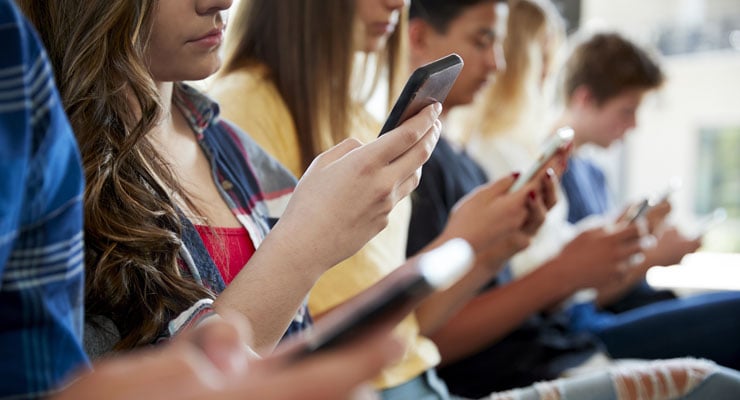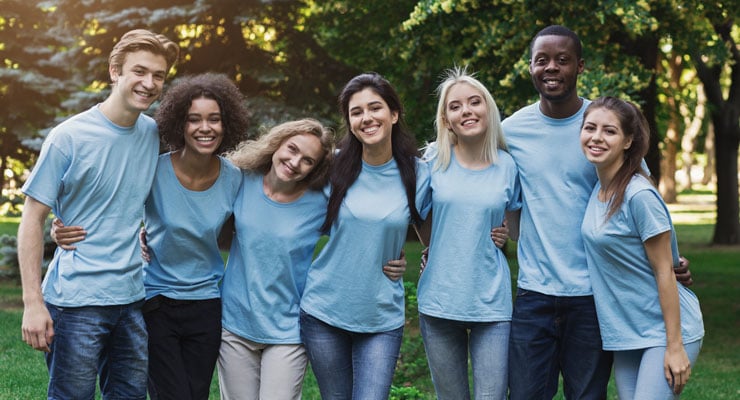How to Unfriend Negative Social Media Habits Before You Get to College
By Emily Young | Last Updated: Mar 5, 2025

Social networking platforms like Instagram and Snapchat are a huge part of our lives. When used in a healthy way, social media links us to a global community, invites us to explore different worldviews, and encourages us to express ourselves — all with the tap of a finger. But it also comes with surprising risks.
Unhealthy social media use can jeopardize your mental and physical well-being and even threaten your college future. If you’re like most people, you might not suspect how many of these damaging practices are part of your everyday life. Here’s how to unfriend negative social media habits before you get to college.
Are You Spending Hours a Day on Social Media?
One hour and 56 minutes is the time the average user spends on social media each day, according to the influencer marketing agency Mediakix. That amounts to more than 5 years on social media over the course of your life — the same amount of time, the study notes, for you to make 32 ascents of Mount Everest or take 93,000 walks with your dog. (It’s possible dogs conducted this study.)
You could argue that spending an afternoon on social media is reasonable. You have no plans to climb Mount Everest. You own a cat who prefers knocking things over to taking 93,000 walks. If you enjoy hearting photos on Instagram, why is it inferior to any other activity?
The problem is that heavy social media use has been linked to depression. According to a recent study, college students who “meet the criteria for major depressive disorder tend to use social media more often.” Greater social media use also corresponds to a greater likelihood of mental health disorders in adolescents, particularly for girls.
Be aware of the mental health risks associated with social platforms and try to cut back on your daily dose. There’s an app to track your usage.
- iPhone users: Apple’s Screen Time shows you how much time you spend on your phone and where you spend it. You might be shocked by the hours YouTube steals from you.
- Android users: Similar to Screen Time, Google’s Digital Wellbeing breaks down your usage per app.
Once you know your daily intake, set realistic limits. A 2018 study found that college students who kept their social media use to 30 minutes a day (10 minutes each for Facebook, Instagram, and Snapchat) felt less depressed and less lonely. If half an hour seems too restrictive, aim for no more than an hour on social media per day, cutting yourself off with an app.
- iPhone users: Screen Time lets you set limits. Once you hit your daily 30 to 60 minutes of social networking, your phone will block you from those apps. You can always override this, but if you find yourself doing it too often, you may want to rethink your media habits.
- Android users: Google’s Digital Wellbeing will close an app once you reach your daily limit. As with Screen Time, it is possible (but not always advisable) to bypass this.
Why you should break this habit before college: College students face a higher-than-average risk for mental health disorders. A 2018 report showed that in the past year, more than 60 percent of college students had “felt overwhelming anxiety,” more than 68 percent had “felt very sad,” and more than 40 percent had “felt so depressed that it was difficult to function.” Learn how to care for your mental health now, starting with savvy social media use. You’ll be better prepared for the stressors of freshman year.
Are You Checking Social Media During Face-to-Face Conversations?
You just listened to your friend brag about how he’s going to climb Mount Everest. Now it’s your turn to share the amazing trick your cat learned (she can sit on command!) when you suddenly realize your friend is scrolling through Twitter. Is he even paying attention?
We all know how hurtful it feels when someone swaps a screen for your story. It’s easy to say, “Don’t be that person.” It’s much harder to resist the hypnotic pull of our phones. In fact, researchers found that the presence of a phone — whether you’re checking it or not — hobbles conversations. Here’s a snapshot of the study, as reported by the BBC:
“Researchers … tasked 34 pairs of strangers with having a 10-minute conversation about an interesting event that had happened to them recently. Each pair sat in private booths, and half had a mobile phone on the top of their table.
Those with a phone in eyeshot were less positive when recalling their interaction afterwards, had less meaningful conversations and reported feeling less close to their partner than the others, who had a notebook on top of the table instead.”
Social media clamors for our attention. If you have 500 friends on Facebook, it can be harder to focus on the one in front of you. Try these tips for more meaningful interactions:
- Turn your phone on Do Not Disturb or Airplane mode.
- Set up an automatic message that lets people know you won’t be responding for a while. You can do this on an iPhone by customizing the “Driving with Do Not Disturb” message or on an Android through SMS Auto-Reply Text Message.
- Hide your phone: Place it in your purse, your backpack, or in the other room.
- Start wearing a watch so you aren’t tempted to pull out the phone and check the time.
Why you should break this habit before college: Eliminating distractions is key to college success. If you can train your brain to disconnect, you’ll be more likely to pay attention in lectures and face-to-face chats with your professors. Plus, college offers you the chance to forge lasting friendships. Don’t let social media limit your ability to connect.

Are You Bringing Your Phone to Bed?
If you fall asleep to the gentle scroll of Instagram and wake to the ping of Snapchat, you’re not alone. In an article for The Atlantic, psychology professor Jean Twenge described the sleep habits of her students: “Their phone was the last thing they saw before they went to sleep and the first thing they saw when they woke up.”
It may feel comforting to rest near a source of instant connection. In reality, that pre-bed Twitter scroll can cause a restless night. If you are an adolescent who uses social media daily, you are “19 percent more likely to be sleep deprived,” Twenge said.
Your phone’s blue light prevents your body from secreting melatonin, a hormone that helps you sleep. Experts recommend shutting off electronic devices at least two hours before bed. These no-phone techniques can help you get better rest:
- Do you rely on your phone for an alarm? Swap it for an actual clock.
- Do you get tons of late-night notifications? Activate “Do Not Disturb.”
- Do you find solace in the sense of connection? Sleep with your dog. According to a study published in 2018, women feel more comforted and secure when they sleep with a dog, compared to a human or cat bed partner. (It’s possible dogs conducted this study.)
- Do you use your phone’s flashlight to investigate bumps in the night? Set a lamp near your bed.
- Do you find yourself unable to stop checking Snapchat one last time? Place your phone in the other room. If that’s too hard, at least keep it out of easy reach. You can also use tangible clues to remind yourself not to check your phone, like wrapping it with a rubber band.
Why you should break this habit before college: Getting enough sleep is crucial for success in school: “More than 80 percent of college students say loss of sleep negatively affects their academic performance.” Don’t let your phone interrupt those precious eight hours a night.
Are You Comparing Yourself to Others?
Social media gives us a glimpse into the lives of friends and strangers. Of course, these glimpses are carefully curated.
You don’t see your friend crying in the bathroom, but you do see the party she attended — the one you didn’t get invited to. In response to your friend’s party pic, you post a photo of your squad preparing for a climb up Mount Everest. This causes your classmate to feel lame (all he’s been doing is teaching his cat how to sit), so he posts a photo of his brand-new car … and so on.
The “envy spiral” is real: People feel envious, so they start “embellishing their Facebook profiles, which, in turn, provokes envy among other users,” according to a research study conducted in Germany.
The result? You think your life is worse than everyone else’s. Here’s how to break the spiral:
- Remind yourself that what you see on social media is not reality. It’s a portrait of reality, carefully painted by each user.
- Avoid passively scrolling. Use social sites to engage with others and post meaningful content of your own.
- Keep a mood journal. Do you find yourself distressed after using certain platforms? Delete accounts that drain you.
- Spend more time offline. Join a student club. Sunbathe on the beach. Reread Harry Potter.
Why you should break this habit before college: It’s common for new college students to think everyone else has “more close friends” and “more exciting social lives,” according to a Harvard report. Start recognizing this as a misconception now, and you’ll avoid that freshman FOMO later.
Are You Posting Unacceptable Content?
Imagine this. You’ve been accepted into Harvard — only to have your acceptance revoked because of what you’ve been up to on social media. In 2017, that actually happened to 10 students who posted offensive memes in a private chat group. The case was proof: Colleges care about your social media. And nothing online is private.
Maybe you aren’t like those Harvard applicants. You’d never share the hurtful memes they posted. But it’s likely that you’ve already stumbled across similarly hateful posts online: According to an article in The Washington Post, “two-thirds (of teens) say they often or sometimes come across racist, sexist, homophobic or religious-based hate content in social media.” Your response to this content is crucial. Make sure you don’t “like” or share hate speech and consider unfollowing the friend who posted it initially. Remember that hateful posts hurt people, even if they’re disguised as jokes. Colleges take it seriously, and so should you.
Unacceptable content goes beyond inappropriate memes. You should also avoid posts that include:
- Alcohol, cigarettes, or drugs. You wouldn’t chug a beer at an admissions interview — so don’t post a photo of yourself doing it on your Insta (or Finsta).
- Nudity. Once it’s online, it’s there forever.
- Profanity. You want to seem level-headed and articulate, not volatile.
- Heated arguments. If you need to keep debating, take the conversation offline.
Why you should break this habit before college: Your social presence is a story you’re telling about yourself. You never know who’s reading it — even college admissions officers.
How to Use Social Media to Your Advantage
Despite the risks associated with social media, you don’t need to delete your accounts (unless, like these counter-culture teens, you want to). When used wisely, social media can be a launching pad for your college and career. Use it to:
- Connect with your interests. Post articles related to your chosen major, follow leaders in your dream career, and network with alumni from schools on your application list. This shows colleges you are “interested in your prospective field,” says U.S. News & World Report.
- Highlight your talents. For example, if you are applying to a fine arts program, you could post samples of your music or artwork (while making sure you are protecting your intellectual property).
- Follow all those cute baby animal accounts. A study in Japan found that looking at a photo of a cute baby animal increased people’s ability to focus. (It’s possible that proud dog parents contributed to this study.)



